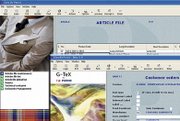IT Companies Strive for Total Automation
Friday, August 27, 2004
Information technology companies have found ways to automate just about every step of business that takes place within the apparel industry. The only problem is that many of these so-called “best-of-breed” applications do not integrate well into others’ systems, leaving customers to do a lot of manual work.
With radio frequency identification (RFID) on the horizon, which requires manufacturers to label their shipments with bar-coded tags that can be read with a wireless device, the need for integration is growing stronger.
IT companies have been on a tear to partner up with these best-of-breed companies. When Gerber Technology Inc. needed 3-D draping tools for AccuMark, it integrated Israeli specialist Browzwear’s V-Stitcher 3-D tool into the CAD system—instead of spending years and a wad of cash on research and development.
But now companies are starting to integrate enterprise applications into one another.
The most recent venture comes from Miami Lakes, Fla.–based New Generation Computing Inc. The company recently linked its system, which manages the physical supply chain, with the financial supply chain that New York–based TradeCard addresses. Now a purchase order is automatically electronically generated and imported into TradeCard, which converts an advanced shipping notice into a commercial invoice. The system automatically compares the invoice to the purchase order using a proprietary compliance engine. If everything checks out, TradeCard enables payment.
The companies have turned their focus to the apparel industry and have quickly gained a number of key accounts, including Ir vine, Calif.–based outerwear and snowboard maker Burton.
Burton’s treasurer, Tom D’Urso, said the system has so far helped trim procurementto- payment costs by up to 50 percent.
“Our trade transactions created mountains of paperwork, which made it tough to capture early payment discounts,” D’Urso explained. “By automating these transactions, we’re able to offer suppliers payment in five days at a discounted rate. We’re surpassing the return we saw from extending payment terms. Plus, we no longer tie up time and working capital with letters of credit.”
Burton uses TradeCard’s Automated Supply Chain Financing Program, which delivers early payment to suppliers in exchange for a discount off the invoice. Suppliers— who sometimes ship 30 to 40 times on a single purchase order, according to D’Urso—sign up for the program instead of making traditional financing or factoring arrangements.
The NGC/TradeCard alignment is a step toward total integration, said NGC’s vice president of sales, Fred Isenberg. No company has yet produced a totally integrated endto- end solution, and many companies are making money just doing file conversions, converting the language of one company’s file into another’s. Until a governing body sets a standard or one company comes up with the umbrella solution, there will always be some chaos, Isenberg said.
The pioneers of RFID technology have aligned with the EPC Global Network to create a set of protocols and standards for the entire industry. But in the meantime, IT companies are trying to address the disparity within the apparel industry. Isenberg said there are as many as 130 steps that can be involved in one order and a little more than half of those are redundant.
NGC is attempting to address these issues by winding its software into a new SQL series, built on Microsoft technology. Through this solution, companies could integrate product development with sourcing and ERP (enterprise resource planning), which includes order processing, EDI (electronic data interchange), costing and inventory management. It is a step toward a totally see-through pipeline that would allow company managers to gain insight into the lifecycle of a product with the click of a mouse.
“You have to eliminate the nonvalue- added steps. That’s the vision we’re trying to achieve,” Isenberg said.
Avery Introduces RFID Service Bureau
Westlake Village, Calif.–based Avery Dennison Retail Information Services has established a radio frequency identification (RFID) service bureau to help vendors comply with new mandates set by retailers and the U.S. government.
RFID uses wireless technology that allows bar-coded labels be read from afar by scanning devices. Wal-Mart Stores Inc., the Target Corp. and the U.S. Department of Defense are requiring vendors to tag their shipments by January.
Avery has established RFID Ticket Express to help vendors that need to supplement their RFID programs or use Avery’s as a substitute. The service offers fieldproven ordering and delivery processes and a global network of RFID-label programming and printing facilities.
The program delivers labels to vendors within 48 to 72 hours of shipments. The system encompasses 35 printing centers in more than 30 countries.
“We receive variable data from our customer, program RFID labels with the electronic product code and preprint them as required with human-readable data, bar codes and symbols,” explained Robert Loop, Avery’s vice president of marketing.
“We then verify the labels’ RFID data, as well as their bar-code readability, and expedite them to vendor facilities worldwide.”
Loop added that cost savings can result because capital investment, operator training, installation and uninstall expenses are basically nonexistent.
For more information, visit ris.averydennison.com.
PacSun Takes on Spam
Anaheim, Calif.–based lifestyle retailer Pacific Sunwear of California Inc. is going to war against the thousands of bothersome unsolicited emails the company gets daily. The retailer has turned to Cupertino, Calif.–based Proofpoint Inc.’s P-Series anti-spam and anti-virus software solutions for help.
The results have been positive, said Dwayne Russell, director of technical services for PacSun. About 95 percent of unwanted emails have been blocked, he said.
The spam influx was so bad at PacSun’s offices that it was consuming the network bandwidth and exposing the company to legal risk because of the offensive nature of certain emails. During a test run, the P-Series application killed 36,000 attacks from the so-called “Sobig” virus that had plagued the Internet.
Proofpoint’s MLX technology examines more than 57,000 attributes in every message, learns from experience and automatically defends against new forms of spam as they appear.
Visit www.proofpoint.com for more information.
PCF Teams With DuPont
Gardena, Calif.–based Pacific Coast Fabrics Inc. (PCF) has signed a marketing deal with Wilmington, Del.–based DuPont to supply fabrics treated with DuPont’s Artistri pretreatments and finishes.
PCF has signed a license to provide a range of treatments for stock and customer-supplied fabrics, including silk, polyester, wool, cotton and nylon/Lycra.
PCF also provides finishing services, supplying DuPont’s Teflon and flame retardants through affiliate Cal Pacific Dyeing, Finishing & Printing Corp., which is located on the same property.
The goal is to provide a consistent, cost-effective alternative, said Joe Gutosky, business development manager for DuPont.
The fabrics are used in conjunction with the Artistri printer, which provides sample, strike-off and short-run digital production printing of fabrics up to 1.8 meters wide. The system prints at speeds topping 50 square meters per hour. It can print directly from a computer and includes a CAD file-format capability to accommodate color separations and color prints.
Tukatech Opens in N.Y.
CAD/CAM company Tukatech Inc. has opened an office in New York to answer demand from its growing base of East Coast customers. The company recently secured a lease at 50 W. 34th St., around the corner from the Empire State Building.
The office will handle sales, service and support for all Tukatech and TukaWeb products and services. Vice President of Operations Paul Clarke is overseeing the implementation of operations.
“The timing couldn’t be more appropriate. With the launch of our TukaCad.net Suite, FedEx-TukaWeb plotting solutions and our 3-D solutions for simulation of samples, New York designers and buyers will also enjoy the benefits from the Tuka group,” said Sonia Chhabra, director of business development.
The New York office can be reached at tukatechNY@tukatech.com or (212) 564-3193.
Porini Signs on International Textiles
Greensboro, N.C.–based International Textile Group (ITG) will use Westlake Village, Calif.–based Porini USA Inc.’s suite of business management software applications to help run its global textile operation.
ITG is the entity formed earlier this year by financier Wilbur L. Ross, who merged Burlington Mills and Cone Mills into one $900 million company. Ross, who expects the company to become a $1 billion enterprise, has been a strong advocate of using technology.
ITG will use Porini’s entire suite of products, including G-TeX, for sales support, order management, production management, purchasing and distribution, as well as visual planning and scheduling tools for optimizing production capacity and resource utilization.ITG will also use Porini’s collection development system to manage product development calendars, product data management, product specifications and costing.
Barbara Sorkin, vice president and chief information officer for ITG, said the company was looking for a complete and flexible solution that could be used with the company’s range of business applications.
“We are thrilled to partner with ITG,” said Porini USA President Enrico Turconi. “The former firms individually have exemplary reputations in the industry, and we think the vision and direction of the new enterprise is very exciting. We feel our complete solution stands out in the marketplace and best enables clients to achieve strategic goals related to speed, flexibility and bottom-line results.”

